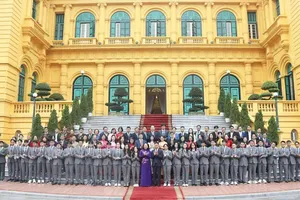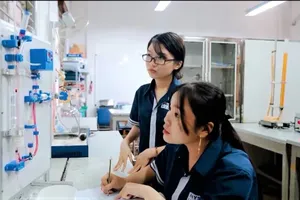
Vice President of Vietnam National University, Ho Chi Minh City Associate Professor Nguyen Hoi Nghia shared that hike in tuition fee is unavoidable in Vietnam if schools want to improve training quality. Present tuition payment in public schools in Vietnam is relatively lower than its peers in foreign countries or in the Southeast Asia region.
He added that public universities must raise tuition fees because university underfunding threatens to undermine the quality of education and value of degrees.
However, it needs a road map to hike tuition fee and schools must adhere to the government’s regulations. On the other hand, granting scholarships and exemption of tuition fee should be done well to attract and provide opportunities for good students with financial difficulties to pursue higher education.
Accordingly, a special bank should be set up to provide loans to students from low-income families who will pay when they have job.
Dr. Hoang Ngoc Vinh, a member of the national education and training renovation consulting committee, said that higher education’s low tuition fees cause bad consequences for society and schools because schools can’t pay good lecturers and attract highly skilled teachers. Graduates will contribute to a country’s growth; therefore, schools can’t train good students with low tuition payment resulting in negative impact on the country’s development.
However, if tuition fees are so high that students will opt for another schools with low quality to have degree for working. Moreover, studies have shown that low tuition charges in some public schools have created unfair competitions between public universities and private facilities and schoolers will underplay their learning, said Dr. Hoang Ngoc Vinh.
Regarding totally self-financing educational institutions having to collect tuition fees according to the decree 86’s framework, Rector of Ton Duc Thang University Professor Le Vinh Danh said that basically, the school can manage to run its activities and ensure training quality with tuition fee of nearly VND16 million (US$689.3) a student yearly. However, the school must practice saving behavior.
Nevertheless, Professor Le Vinh Danh acknowledged that with such tuition fees, the school finds it hard to spend on purchase of teaching equipment and labs. In short, the present tuition fee is just enough to cover basic activities and researches and graduates can somehow meet a certain job requirements.
According to President of the University of Medicine and Pharmacy Dr. Tran Diep Tuan, while the state budget can’t cover payment in higher education facilities, social contribution is needed. The country is aiming at competing with their peers in the world so hike in tuition fee is a must because low tuition payment is detrimental for training and facility purchase.
























